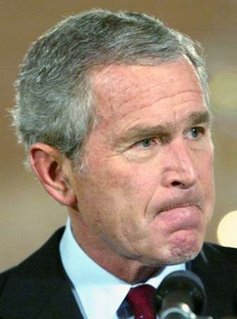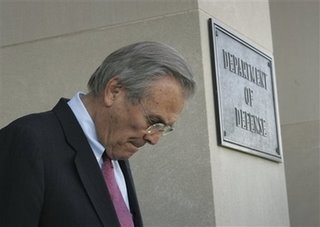 But even they could not remain unaffected by the growing crescendo of doubts about their leadership being expressed by the soldiers they misled to war in Iraq. And this chorus of doubts led inexorable to the alienation of affection between them that was consummated yesterday.It was disingenuous, however, for Bush to offer the need for a “fresh perspective” (from a “fresh pair of eyes”) as his rationale for firing Rumsfeld. Because calls for his head were sounded almost three years ago, when Rumsfeld arrogantly and ill-advisedly dismissed Iraqi insurgents – who have since killed over 2,500 American soldiers – as no more than a few “dead-enders”.Moreover, in fairness to him, it is a matter of public record that Rumsfeld tendered his resignation over two years ago (in the wake of the Abu Ghraib scandal) to enable Bush to get a fresh perspective after his re-election in 2004. But Bush rejected it and expressed born-gain faith in Rumsfeld’s leadership.
But even they could not remain unaffected by the growing crescendo of doubts about their leadership being expressed by the soldiers they misled to war in Iraq. And this chorus of doubts led inexorable to the alienation of affection between them that was consummated yesterday.It was disingenuous, however, for Bush to offer the need for a “fresh perspective” (from a “fresh pair of eyes”) as his rationale for firing Rumsfeld. Because calls for his head were sounded almost three years ago, when Rumsfeld arrogantly and ill-advisedly dismissed Iraqi insurgents – who have since killed over 2,500 American soldiers – as no more than a few “dead-enders”.Moreover, in fairness to him, it is a matter of public record that Rumsfeld tendered his resignation over two years ago (in the wake of the Abu Ghraib scandal) to enable Bush to get a fresh perspective after his re-election in 2004. But Bush rejected it and expressed born-gain faith in Rumsfeld’s leadership.
Therefore, since Bush seems determined to avoid the question, it shall fall to historians to explain why he chose “the day after” to fire Rumsfeld. After all, he vowed not to do so (as late as last week) no matter how many politicians and generals urged him to, and no matter how stagnant and costly (in terms of lives and money) Rumsfeld’s Iraq strategy became. And never mind that had he done so before Tuesday’s elections, he might have spared his Party that “thumpin”.
Meanwhile, rumor has it that Rumsfeld did not want to cut and run. Therefore, one can only imagine the blow to his ego at being fired.
 In fact, he must curse the irony of being heralded when he arrived at the Department of Defense as the man who would transform the military into a lean fighting machine “to meet the asymmetric challenges of the 21st Century”. (Then vindicating his visionary military strategy by planning the shocking and awesome ouster of the Taliban from Afghanistan.) Only to be scapegoated as he’s forced to leave as the man who was fired for leading that military down a primrose path – back to the future – into a quagmire where it’s fighting a decidedly 20th Century (Vietnam-style) war in Iraq.
In fact, he must curse the irony of being heralded when he arrived at the Department of Defense as the man who would transform the military into a lean fighting machine “to meet the asymmetric challenges of the 21st Century”. (Then vindicating his visionary military strategy by planning the shocking and awesome ouster of the Taliban from Afghanistan.) Only to be scapegoated as he’s forced to leave as the man who was fired for leading that military down a primrose path – back to the future – into a quagmire where it’s fighting a decidedly 20th Century (Vietnam-style) war in Iraq.
Nonetheless, I fail to understand (not that Bush’s critics have even bothered to explain) how changing control of Congress or firing Rumsfeld will improve conditions on the ground in Iraq. And it’s probably too late to execute what I thought was the only way to rebuild Iraq’s infrastructure and form a viable federal government: Namely, to implement a Marshall Plan (a la post WWII Japan) under martial law enforced by the “several hundred thousand US troops” the truly visionary Gen. Eric Shinseki said would be needed in postwar Iraq.
I fear the only hope now is to partition the country into Kurdish, Shiite and Sunni zones and leave them to defend their own borders and barter (or fight) for a share Iraq’s oil wealth. (A last resort which the BBC reported on in this article here last summer.)
So, here’s to the triumph of opportunistic politics over failed military strategies….
But, just for the record, what’s the new course Nancy?
NOTE: In his book Bush at War, Washington Post reporter/author Bob Woodward made headlines by chronicling Bush’s antic disposition to shun his father’s advice. But this would seem belied by the fact that he has filled key positions in his administration with people who advised his father as president. And these include Colin Powell – his former Secretary of State, James Baker – co-chairman of the Iraq Study Group he clearly hopes will offer guidance to salvage his Iraq policy, and now Bob Gates – the man he nominated yesterday to replace Rumsfeld.
Indeed, the nature of this father-son relationship is far more complex (at once Oedipal and appropriately filial) than many people seem to appreciate. For example, there’s good reason to suspect that Bush the son got America into this mess in Iraq in a misguided attempt to upstage and avenge his father – who was called a wimp for not invading Iraq during the 1991 Gulf War and was targeted by Saddam Hussein to be assassinated.
Donald Rumsfeld resigns
WeblogBahamas.com says
I just can’t wait to see the Democrats great plan. If they have one.